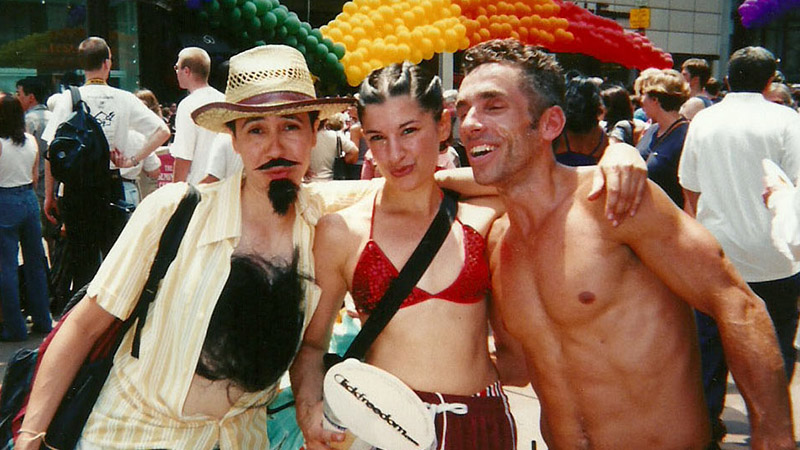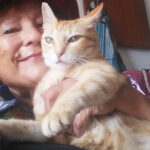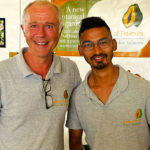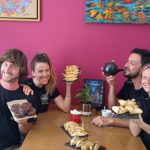By Sophie Sadler
For the first time in his life, Tom is finally feeling settled after discovering the western Algarve and renting a property in Burgau. “Life feels comfortable and easy here,” he says. Achieving this life has not been easy for Tom, whose extraordinary autobiography Living off the Edge recounts his struggles to survive and live happily in spite of the euphoric highs and devastating lows that life has thrown at him.
Born Tom Weise in Germany, he had an unhappy childhood with parents and a brother who he later came to realise had all been abusive. He came out to his parents when he was 20 and their reaction was very non-caring and nonchalant. “It was almost as if it did not matter to them. I only remember my father’s reaction when he suggested setting me up with a prostitute and my mother said something on the level of ‘well that’ll turn him off women for sure’.” An irony considering where his life would take him.
He was diagnosed with HIV in the late 80s when the media first started reporting on AIDS. At that time, Tom knew it could be a death sentence. He felt compelled to leave Germany, where death was “a taboo subject” and he didn’t feel he belonged. After travelling the world, he arrived in New York, where a gay subculture flourished and he would be accepted living with the virus.
After his regular visa ran out, Tom realised his HIV status didn’t let him stay, but he was stoic and overstayed his visa. This meant he had to resort to the seedier elements of life under the radar. He became a dancer in nightclubs and a rent boy.
At that time the only treatment for HIV was AZT antiviral drug which he combined with an inhaler. He describes the drug as “toxic with many side effects”. Thousands died of AIDS in the 1990s; Tom survived, but every year he suffered from related illnesses. “I was often very ill and close to death on several occasions and so there were moments when I believed there was no tomorrow. Subsequently, I experienced survivor guilt, and asked myself ‘why me’. Luckily, I survived long enough to be able to take the new treatments available by the mid-1990s.” Tom now takes one pill a day and lives a normal life thanks to developments in medical science.
Then in 1996, with the start of the internet, he started a portal rentboy.com and became the frontman for the business. This led him away from prostitution and to become well known in the gay and lesbian world. He had his own float at Gay Pride in NYC and also fronted a radio show. “This is how I came to live out my illegal immigrant world,” he reflects.
Having seemingly overcome his own difficulties, Tom turned to philanthropic endeavours for others. His own status as an illegal alien inspired him to help others in a similar situation. He funded and started a programme with Riverside Church in NYC which mentored immigrants who were detained. “They were and still are treated worse than a criminal and end up in detention centres.” Every weekend he and other volunteers would go and sit with the detainee and try to accommodate them and help them. He even tried to bring attention to those on hunger strikes through his radio show.
He helped over 20 charities and was connected to many gay youth organisations including Sylvia’s Place. The centre – named after a transgender individual – gave a meal and a bed to LGBT children and youths who had become homeless, often as a result of their family not accepting them. He also worked with the non-judgemental NYC community church where gay youths are supported.
Tom’s first foray into writing came when he went to memoir classes, which turned into a kind of therapy. While recounting some of his childhood relationships with his family, one of his classmates suggested that what he had suffered from his parental relationships were sexually and verbally abusive.
Tom with his kids Travis and Malachi in Hawaii 2003
He has had no contact with his family for 30 years, apart from one meeting with his brother, who physically abused him, 15 years ago. “We don’t choose our families; we choose the friends that become family. I always envy people that do have good family bonds and say appreciate the love and care you have from your family because it isn’t a given.”
He met his new family, Keith, in 2006. How did Keith feel about Tom’s past? “He was actually fine with it all, he did not know who I was in my public life and did not care about the glamorous but also dark side of it. He did, though, very much love my community work and the fact that I had raised two kids.”
Tom took care of two boys with HIV and raised them as if he was their own dad for five years. He was heartbroken when they were taken away from him. He was becoming under more scrutiny due to his increasingly public work so he decided to leave the US voluntarily after 13 years.
He travelled the world with Keith, and besides New York, they lived in Berlin, Barcelona, Peru and Costa Rica. They toured Europe and settled in Paris in 2010. They married in the French capital in 2013 when Tom became Tom Richmond and they visited Lisbon on their honeymoon.
After encouragement from friends, Tom wrote the book in a two-year time frame when he and Keith lived in Paris. He found it psychologically hard to put everything into words. “My only other writing was in the classes in New York and I don’t consider myself a writer. Writing a book is very solitary and recounting my past was brutal, especially putting down the part about the abuse from my family. But it was great to accept it and move on, and leave aside guilt or blame and put it in the past. I would encourage someone in a similar situation to write it down, whether they intend to publish it or not.”
Keith and Tom’s wedding in Paris 2013
He doesn’t want the book to be about being gay or having HIV. “This book’s ambition is to talk about the millions of immigrants in the world, not just the gay community. This is a world of borders and I say to immigrants don’t give up. Look for countries like Portugal, which are more open with simple immigration rules. There are still places in this world where people can find sanctuary and they should be encouraged with this story. I did it and found a home even with the burden of HIV and being gay.”
He believes his journey now ends in the western Algarve, which he discovered two years ago and appealed, due to its liberal mentality. “I have to give it to Portugal and its people that this is a friendly and welcoming place. It is also becoming a mecca for spiritual healers and I am now on my own spiritual journey.”
What does he think life is like for Portuguese gay men? “It is a Catholic community, so it is still difficult for LGBT people to come out of the closet. The hub of gay life in the Algarve is Portimão and there are centres for gay men and treatments available to prevent them from contracting HIV. Lisbon is a gay-orientated city and gayuk.com listed it as being one of Europe’s gay capitals in 2019. Increasingly Lagos is getting onto the gay tourist trail with nudist beaches and parties, and despite being a Latin culture I think the ‘live and let live’ mentality of the Portuguese will result in more acceptance in the future.”
Keith and Tom in Cusco, Peru 2016
He is now looking to help refugees arriving in Portugal. “I feel very grateful to settle in such a peaceful place. There is not too much of anything from climate to people to the economy, everything is balanced and not overly developed. We didn’t know anyone here, so we definitely had a blind date with the western Algarve, but we immediately fell in love. We now want to buy a house and stop travelling!”
His conclusion to his life’s tumultuous journey: “The problem is that everyone is trying to find their own place in the world, but many face restrictions in getting there. My advice is never to give up on finding your place on this planet because it might not be the country in which you were born.”

















